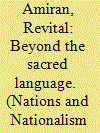| Srl | Item |
| 1 |
ID:
090695


|
|
|
|
|
| Publication |
2009.
|
| Summary/Abstract |
This paper aims to shed light on the evolution of the Jewish national language and to discuss the ways in which the cultural trends in Zionism constantly left room for the creative imagination of its adherents, and functioned in such a way as to erode its sacred dimension, thereby promoting a discourse focusing on the individual. My claim is that the Hebrew language case study may reflect the importance not only of national revisionist accounts for our understanding of the Zionist movement, but also the need for an approach that saves a place for truly creative aspects of civic engagement, and recognises the Israeli nation as one asserting, besides its ethnic ties also patriotic nexuses. Special attention will be given to the phenomenon of Hebrew poetry written by women in the 1920s as a platform from which to examine the unique meaning and evolution of language within the Jewish national movement.
|
|
|
|
|
|
|
|
|
|
|
|
|
|
|
|
| 2 |
ID:
156773


|
|
|
|
|
| Summary/Abstract |
This article explores the recent rise of populist politics from the perspective of Karl Polanyi's theory of the ‘double movement’. It firstly introduces Polanyi's understanding of interwar populism, and relates this to his broader critique of liberal economic thought. This framework is then used to analyse three prominent explanations for populism which emerged in the wake of the UK's 2016 EU referendum: globalisation; cultural reaction; and social media. I show how each of these explanations exogenises contemporary populist movements, narrating them as something external to the liberal economic restructuring pursued globally since the 1980s. Failing to diagnose adequately the causes of contemporary populist movements, which lie in this utopian attempt to treat labour as a commodity, they cannot support an intellectually coherent progressive response to Brexit. Finally, I outline a political agenda centred on labour de-commodification, which could directly address populist grievances and reclaim the discourse of ‘taking back control’ for the left.
|
|
|
|
|
|
|
|
|
|
|
|
|
|
|
|